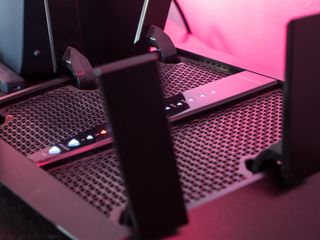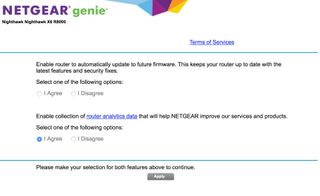Netgear Nighthawk X6 R8000 gets auto-update, analytics features
Your network is the key to streaming video. You should keep it updated

We all have to think a little more about networks these days. No longer are they just the way you get online to check email or chat or surf the web. No, for cord-cutters, your home network is now the backbone for all your streaming video alongside all that other network traffic. And one of the most important things you can do is keep your router updated.
Why? Features, for one thing. Companies add new stuff all the time. But even more important is security. Bugs happen. But bugs also can be fixed with updates. (In the news recently: The FBI asking you to reboot your router to help snuff out a Russian botnet.)
Most "regular" folks would prefer to never have to think about their router. And that makes automatic updates even more important. Some routers have it, some don't. One popular model — the Netgear Nighthawk X6 R8000 — just got a firmware update that enables automatic updating.
First, here's the full changelog for 1.0.4.18:
- Supports collection of router analytics data.
- Added support for SHA256 certificates in lieu of MD5 for OpenVPN.
- Supports the Auto firmware update feature.
There are a couple of things to think about here. Let's start with the automatic updates. If you want to enable them, you'll need to do so through the web interface. (I couldn't find an option in the Netgear Genie app.) You get to that by tying www.routerlogin.net or www.routerlogin.com into your browser. (Or do it the old-school way — generally it's found at 192.168.1.1 or 192.168.0.1 — just type in one of those and pretend you're a hax0r.)
Once you've applied the 1.0.4.18 firmware update and log back in (you've set yourself a good router password, right?), you'll be presented with the screen to apply automatic updates and collect analytics data. Both are optional.

Auto-updates and analytics tracking are optional (and opt-in) features.
Generally, automatic updates are a good thing. The router manufacturer can keep things updated in the background, without you having to worry about it. But on the other hand, updates do occasionally go bad. We've seen it happen with Google's mesh system before, among others. It's rare, but it does happen. And it's annoying when updates go wrong. But on the whole, it's worth the slight risk to help keep things up to date.
Get the What to Watch Newsletter
The latest updates, reviews and unmissable series to watch and more!
Then there's the matter of "router analytics data." Netgear is pretty up-front about what's going on here as you apply it.
Technical data about the functioning and use of our routers and their WiFi network can help us to more quickly isolate and debug general technical issues, improve router features and functionality, and improve the performance and usability of our routers. Such data may include information regarding the router's running status, number of devices connected to the router, types of connections, LAN/WAN status, WiFi bands and channels, IP address, MAC address, serial number, and similar technical data about the functioning and use of the router and its WiFi network.
By clicking "I Agree" you agree that upon installation, your router may transmit the data described above to NETGEAR, which may use the information to provide and improve its products and services. For additional information about the protection of your transmitted data and how it may be used see the NETGEAR Privacy Policy. NETGEAR does not use this information to market products or services to you or to track or collect the websites you visit or collect the content of any traffic on your network. You may withdraw this consent at any time by going to the routerlogin.net Advanced>Administration>Router Update.
In addition, with or without the prior consent, some basic information, such as the router's firmware version number and model number, may still be collected and used to monitor deployment of NETGEAR products and firmware versions. We will not link such information to your router's serial number or MAC address or your name or other personal information.
That's important stuff to read. You'll be giving Netgear information about your router itself — and how many (and what kind of) devices are connected to it, among other things. This part is all optional, and indeed it does help a company improve its current products, as well as newer products. You just have to let it know a little more about what you're doing with your stuff.
Should you give Netgear analytics data? That's your call. You've already given them your money.
